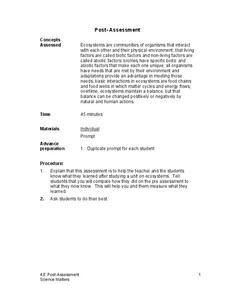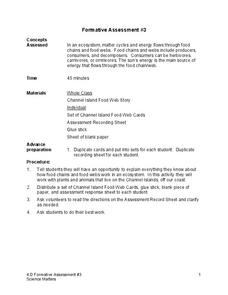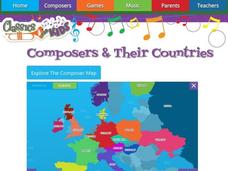Curriculum Corner
St. Patrick's Day Color Key Addition
Young leprechauns solve basic addition facts and use a color key to bring a set of St. Patrick's Day-themed sheets to life.
K12 Reader
Adjectives: Which Noun Does It Describe?
Adjectives can come before or after the noun they describe. Eight simple sentences prompt learners to circle the noun that each underlined adjective is describing.
K12 Reader
Adjectives: Add the Noun
Learning how to use adjectives isn't just about adding describing words! Pupils select original nouns to add to ten adjectives in a straightforward grammar worksheet.
K12 Reader
Adjectives Describe
Vivid writers all start out the same way: learning in elementary school how to use a variety of adjectives! Young grammarians add adjectives to eight fill-in-the-blank sentences.
K12 Reader
Comparatives and Superlatives: Halloween Edition
What's the spookiest thing about Halloween? Which haunted house is ghostlier than the others? A list of Halloween-related adjectives await your elementary learners, along with columns to write the comparative and superlative forms of each.
K12 Reader
Alphabet Collection: Adjectives
Grammar enthusiasts show what they know with a practice page that challenges scholars to list an adjective for every letter of the alphabet.
Science Matters
Post-Assessment
Twenty questions make up an assessment designed to test super scientists' knowledge of ecosystems. Scholars answer multiple-choice and short-answer questions about organisms, food chains, energy flow, and more.
Science Matters
That’s An Otter Story
Young scientists discover how sea otters' habitats have changed due to human impact. Through conversation, video observation, and story reading, scholars identify how human interactions change a specific ecosystem in both positive and...
Science Matters
Formative Assessment #3
Thirteen short-answer questions follow a brief food web activity in a formative assessment designed to test knowledge of ecosystems and the energy that flows through them.
Science Matters
Energy Flow
Budding scientists work collaboratively to reenact energy flow in a food chain. Scholars take on roles such as producer and consumer and perform tasks that symbolize energy flow in order to provide evidence of how much energy passes...
Science Matters
Crawly Composters
Get your hands dirty with an interactive lesson that showcases the process of decomposing and returning nutrients back into the soil. After building a compost pile, pupils regularly observe the ways worms help with changes to the soil...
Science Matters
Mighty Microorganisms
How can you tell if a microorganism is helpful or detrimental to an ecosystem? Learners inspect slides or pictures of microorganisms and record their observations to identify those that are beneficial or harmful. They then pretend to...
Science Matters
Formative Assessment #2
Learners work collaboratively to predict what life would be like as an Arctic Hare. Teams go on a hunt where scholars role play an owl, white hares, and gray hares. Independently, pupils record their findings and reflect on their...
Science Matters
Lotusland
It's time for a field trip! Scholars take their new-found knowledge of adaptations and seed dispersal on a field trip to a local botanical garden. They gain an up-close look at how ecological interdependence works in a distinct...
Science Matters
Basic Needs
Scholars take part in a grand conversation about the basic needs of living things. Working collaboratively, pupils brainstorm and identify similarities to come to the conclusion that the environment meets the needs of all living things.
Science Matters
Formative Assessment #1
Discover how much your young scientists know about biotic and abiotic factors with a two-question formative assessment that requires them to observe, list, and describe.
Science Matters
Ecosystem Pre-Assessment
Test scholars' knowledge of ecosystems with a 20-question pre-assessment. Assessment challenges learners to answer multiple choice questions, read diagrams, and complete charts.
Curriculum Corner
Spring Find a Fact Addition
Test scholars' knowledge of addition facts with a festive worksheet that makes adding a two-person game. Pairs examine a grid of numbers to locate and color addition facts. Last person to color three squares wins!
K12 Reader
Circle It! Indirect Objects
If you give this activity to your class, make sure you know where the indirect object is! Young grammarians work on their grammar skills with a series of ten sentences, each with an indirect object ready for pupils to circle.
Hookshot Creative
Compose Your Own Music
Channel the masters with an interactive music composition activity! Learners use the online tool to create their own masterpieces one measure at a time.
Classics for Kids
Listen to the Music
Different pieces of music can elicit different emotions from audience members. A quick tempo can make you feel happy, while a largo piece may bring out a melancholy temperament. Elementary musicians learn more about the instruments and...
Classics for Kids
Instruments Have a Family
Are the instruments in Bach's Brandenburg Concerto No. 2 in the same family as those in George Gershwin's Rhapsody in Blue? Elementary musicians work on their music theory and their instrumental ear as they listen to clips of famous...
Classics for Kids
Composers Timeline
Take a quick tour through the last 350 years of music composition with an interactive timeline tool. As learners scroll through the years, they see which composers were born and working during the Baroque, Classical, Romantic, and Modern...
Classics for Kids
Composers and Their Countries
How many of the world's greatest composers were born in Austria? Or Germany? Or the United States? An interactive map provides young musicians with information about prominent composers in the last few centuries, as well as the periods...

























